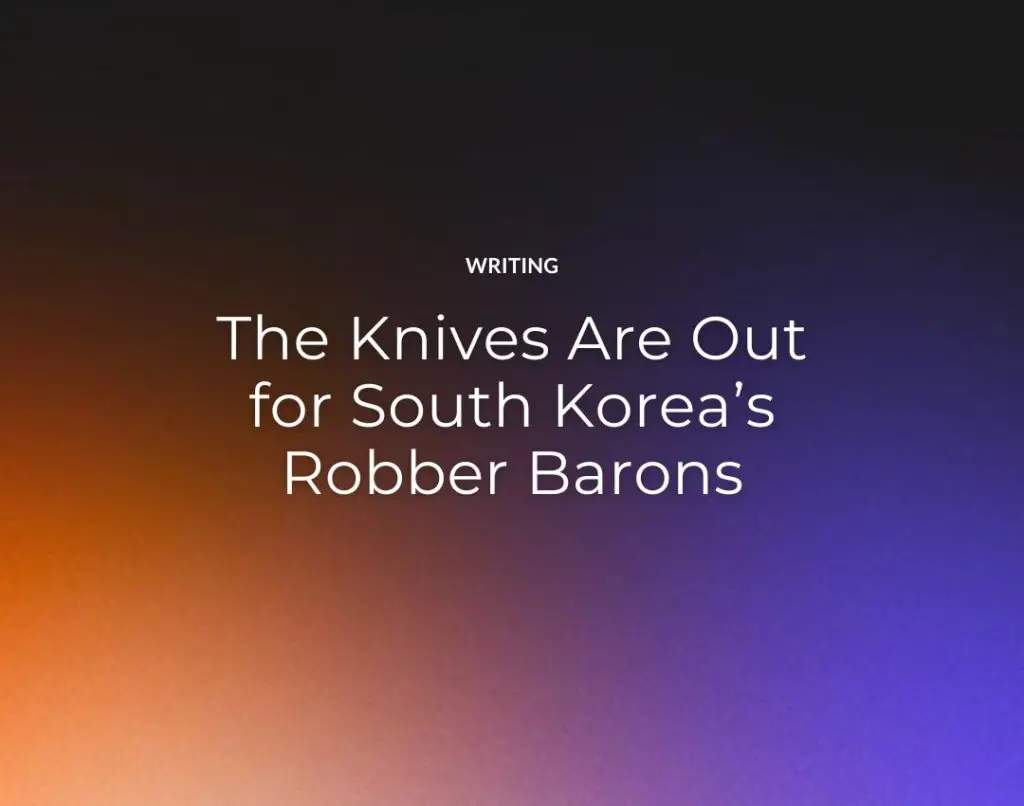By Geoffrey Cain
Foreign Policy
Jun 23, 2017
Business clans have dominated the country’s economy for decades – but their time may finally be up.
“I was a god,” the scion proclaimed to me over dinner, reminiscing about the glory before his downfall. “Now I’m a man.” For decades, he’d been groomed as a member of a powerful Korean dynasty, where he lorded over platoons of workers executing his orders with military-like efficiency. Then the endgame arrived. The patriarch of his court died, and he was ousted in a succession battle teeming with intrigue, espionage, and unholy alliances. The heir was effectively banished; he rode out his career in a minor branch of the family trade.
This may sound like the vicious monarchy of North Korea, but it’s actually a true-life parable about the economy in the South. South Korea’s corporate emperors aren’t quite as ruthless as the commandants north of the border — North Korea’s supreme leader can command his half-brother to be murdered and his uncle by marriage to be executed — but they’ve dug out their own cultish strongholds in dynastic groups called chaebol (“wealth clan”), which have been, and still are, the engines of South Korea’s economic miracle. Here they live out the royal drama of past centuries, commanding familiar names like Samsung and Hyundai.
Like many aristocratic cultures, chaebol are marked by an unmistakable streak of militarism. The businesses designing your smart phones, cars, and the parts inside them are separated into highly regimented units that adhere to an extraordinarily rigid corporate hierarchy. On a personal level, chaebol scions are also given to thuggish outbursts, like the Hanwha chairman who was convicted of hiring gangsters for a revenge attack and personally wielding a steel pipe, and the Korean Air heiress who assaulted her airline’s flight attendant and halted takeoff because her first-class nuts were served in a bag and not on a plate. (The former was off with a presidential pardon; both walked free from their sentences early.) South Koreans have a word for this type of abuse: gapjil. It’s the right to bully people lower on the hierarchy, to punish the weak with impunity, to treat yourself like royalty.
Chaebol groups like Samsung played a remarkable role from the 1960s to 1980s in moving authoritarian South Korea out of poverty. But increasingly they are cultural relics in a developed democracy that has recently been swept with mass protests and the removal of its former president, Park Geun-hye — the daughter of a former dictator who helped build the chaebol system — in March over a wide-reaching political scandal. Of course, obsolescence isn’t necessarily a prelude to disappearance. Chaebol are still central to the Korean economy (even if they impair its long-term growth), and they remain tolerated by the public (even if they help corrupt the country’s culture and politics). It’s no accident that Korean leaders have repeatedly promised to pass new regulations that would cut the chaebol down to size, only to pass the buck to their successors.
Hopes have been higher among chaebol critics for newly elected liberal President Moon Jae-in. And there was reason to take him at his word when he promised to take a harder stand on the chaebol: His chief fair trade regulator, Kim Sang-jo, is a man of strong opinions who’d tussled with Samsung executives at a shareholder meeting in the past. But Kim’s tempered promises after being appointed, however, have not lived up to his fiery record. He has restated, as past administrations have without results, the obvious need to enforce existing laws and expand the rights of sidelined shareholders, emphasizing that he’ll apply tougher standards to the biggest four conglomerates.
Like the banks of Wall Street, the chaebol have a long history of escaping trouble. But chaebol have little in common with the more entrepreneurial and shareholder-driven firms in the United States, where even the longest-surviving companies — whether in New York or Detroit or Silicon Valley — haven’t enjoyed privileges close to what exists in South Korea today. Imagine if the Carnegies and Edisons passed on their bedazzling family fortunes and were feared names whom, three generations out, the New York Times self-censored out of reverence; if the White House pardoned Fords and Waltons and Krocs as they ran Ford and Walmart and McDonald’s from their prison cells; if Bill Gates and Steve Jobs built family dynasties in Silicon Valley rather than passing their companies to new blood in Microsoft and Apple; or if mainstream journalists covered their eyes when confronted with Donald Trump’s myriad conflicts of interests between his presidency and his businesses. South Koreans call their country the “Republic of Samsung”; imagine how odd it would sound if America were called the “United States of Apple.”
Chaebol are unique in their remarkable ability to game the system of public ownership: they turn to shareholders for funding while managing, despite repeat shareholder challenges, to keep the actual power within the family. Samsung Electronics, for instance, is publicly traded, with Chairman Lee Kun-hee, incapacitated and bound to a hospital suite since having a heart attack in May 2014, owning 4 percent of shares. His wife, Hong Ra-hee, and their son and heir, Jay Y. Lee (known to South Koreans as Lee Jae-yong), each own less than 1 percent of shares. Yet the Lee family effectively controls this and other Samsung companies through a messy spaghetti bowl of cross-shareholdings, befuddling even the most astute of analysts. The so-called “Samsung Group” isn’t even a legal entity. It’s merely a term that the empire uses for its maze of 59 affiliates with a shared name, all effectively reporting to the Lees. The words of the father in particular and son less so, Samsung employees tell me, is like a page from the Bible, a tablet of wisdom coming down from high, unchallengeable and unassailable.
Whatever today’s chaebol might have in common with America’s barons more than a century ago, South Korean policymakers look elsewhere for lessons: Finland’s Nokia, Sweden’s Wallenberg family of industrialists and bankers, and Israel’s industrial conglomerates with wide-ranging ownership of real estate and telecommunications. But these pale before South Korea’s chaebol, which are fundamentally an outgrowth of fascist Japan from before and during World War II. Much like South Korea’s “big four” corporate empires today, imperial Japan had four central family houses (including surviving names like Mitsubishi and Mitsui) that reigned over industry, called the political shots, manufactured everything from the parts to the final products like for weapons and tanks, and fomented spasms of popular resentment. The Japanese called these empires the zaibatsu — which, like chaebol, means “wealth clan” and shares the same Chinese characters. At the height of World War II, they were the largest and most vertically integrated corporations in the world, existing nowhere else on this scale.
From 1910 to the end of the conflict, Japan ran the Korean Peninsula as a colony, reshaping the impoverished kingdom in its industrial image far more thoroughly than the French did to Indochina, the British to India, or the Americans and Spanish to the Philippines. The progenitors of some of today’s biggest business groups in South Korea were educated in Japan, tapped into their Japanese networks, learned from Japanese corporate practices, and bought up their former colonizers’ inventories in fire sales by the postwar American military government. Samsung (“Three Stars”) founder Lee Byung-chul, for one, was probably eyeing Mitsubishi (“Three Diamonds”) when he started the company in 1938.
The Allied occupation, however, forced Japan to lessen its embrace of racial purity and abandon family industrial power, purging the zaibatsu of family executives and seizing inventories. Meanwhile, South Korea (along with North Korea) inherited, nearly uninterrupted, many of its ex-master’s fascistic practices for the decades to come. Even as South Korea publicly disavowed any connection to Japan — most Japanese cultural products, including films and comic books, were banned until 1998 — its culture and economy remained fundamentally warped by Japan’s imperialist model. In the mid-1950s, South Koreans began using “chaebol” to describe groups such as Samsung, which had amassed fortunes through manufacturing sugar and paper, the manipulation of U.S. aid money, and brute lobbying on economic policy.
In 1961, a general named Park Chung-hee, who’d served under the Japanese army in the industrial base of Manchuria, launched a coup d’etat and proclaimed a new republic. Park disliked the garish wealth of the then-dead zaibatsu and instead put the chaebol families to work underneath his regime for the betterment of the nation. This consisted of breakneck export quotas and preferential loans for high-performing businesses, protectionism against foreign imports, clamping down on runaway financing by the banks, and generally making life hell for noncompliant chaebol bosses by exposing their dirt when it was convenient, convicting them, and letting them off. This set a model of unhealthy chastisement and compliance that continues today. His national champions were Hyundai and the steelmaker Posco, a former Warren Buffett investment. But it wasn’t until after Park’s assassination in 1979 that South Korea and its chaebol went truly global.
As the world was aping the Sony Walkman and Trinitron TV from Japan, and the early IBM and Apple personal computers from the United States, the chaebol had become advanced enough to win supplier contracts for the chips, displays and refined materials in these products. They hired Japanese engineers to moonlight on weekends and copy foreign technology while making above-the-table deals for other, more legitimate technology transfers. As their size and sophistication ballooned, the biggest chaebol became equals at the government’s negotiating table.
But as they got too big to fail, the chaebol collected bad loans and expanded carelessly, ushering the near-collapse of the system during the 1997 Asian financial crisis. For the surviving groups, it was a secret blessing. Samsung, for one, cleared out wasteful ventures and a bloated bureaucracy to focus on digital TVs and handsets and cutting-edge displays, giving it the firepower to beat Japan’s Sony and eventually turning it into a nameplate brand with the Galaxy smartphone.
On the flip side, the chaebol never got the purges of family power that politicians and populists were calling for. The highly successful Hyundai Group is just one example of a conglomerate that, upon the death of its charismatic founder, Chung Ju-yung, in 2001, broke apart in a bizarre family soap opera that hurled many of its spun-off companies into terminal decline. The Japanese-South Korean retailer Lotte has since witnessed its own family self-implosion, a palace coup by a younger brother against his older one; Chairman Shin Dong-bin has since been indicted and awaits trial for allegedly giving $6.2 million in bribes to a foundation run by the president’s political ally. In February, one of the world’s largest shippers, South Korea’s Hanjin, went bankrupt due to global industry struggles. Its heir also admitted that when her husband died, she’d been working as a housewife and didn’t know how to run a shipping company.
Rather than suppress these aristocratic squabbles, the government has instead allowed the biggest chaebol to expand to unseen levels since the financial crisis, standing by as income inequality rises and as princes ascend to their thrones on birthright. Because of their influence, huge numbers of chaebol family leaders can get away with being literal crooks. Since 1995, at least 17 chairmen at major groups including Samsung and Hyundai have been convicted of either bribery, embezzlement, or other white-collar crimes. Many have been pardoned without serving prison time. At least three of them — Samsung Chairman Lee Kun-hee, SK Group Chairman Chey Tae-won, and Hanwha Chairman Kim Seung-youn — have been pardoned twice by separate presidents, who cited their economic contributions to the nation, returning to their company thrones and praised to the skies in the mainstream South Korean media.
In the grim chaebol tradition, the heir to the Samsung empire, Vice Chairman Jay Y. Lee, has been sitting in a jail cell since February, awaiting trial for bribery, embezzlement, and perjury. The Samsung prince stands accused of paying $38 million to benefit former President Park Geun-hye’s ally in exchange for political favors, such as alleged support for a merger in 2015 that nixed protesting shareholders but pushed along Samsung’s dynastic succession. It’s a troubled project two decades in the making that has already led to the criminal convictions of other executives in a separate court case.
On June 8, the former Minister of Health and a top pension official were convicted of illegally swaying the National Pension’s Service shareholding vote in favor of the merger, damaging the retirement body’s own stake in Samsung’s construction company. The remaining defendants have denied wrongdoing. Regardless, the long-standing pattern of impunity for chaebol families doesn’t bode well for the reforming instincts of Moon, the new president. Despite recent protests against collusive chaebol-government ties, South Koreans by and large continue to treat these dinosaurs with a bitter blend of patriotism and love-hate pragmatism — love for their prestige and job stability and hate for their outsized power. Surveys show that South Koreans see these business empires as a low priority for reform by Moon — despite a pattern of reckless deals that stroke family egos but suck from public coffers and evade market sensibilities. Five of the biggest groups account for half of the South Korean stock index. Samsung Electronics alone accounts for a fifth of the nation’s exports, and the Samsung Group’s publicly traded firms have a market capitalization accounting for one-fourth of the value of all listed companies in South Korea. The chaebol are simply, as the cliché goes, too big to fail.
This line of thinking should not extend to their ruling families. On paper, Samsung has been run for three years by a man who remains incapacitated in his hospital room after waking up from what Samsung claimed was a brief coma. His heir — the one actually running the show since then — has languished in his jail cell for four months. At the typical publicly traded company, share prices would plummet, business operations would be chaotic, and shareholders might revolt on evidence of bad behavior, forcing the chief to step down as Uber witnessed on June 21. But at Samsung Group, the absence of the glorious Lees has had little bearing on the record profits and stock prices of its crown jewel Samsung Electronics. An end to family rule at other successful companies—where stock prices have also continued rising, nearly unfazed upon the criminal convictions of their chairmen—would yield the same results. This is, after all, one the world’s most highly educated and technologically advanced countries. Its people are well beyond the need for tending by clannish aristocrats.
Moon has entered office with fortuitous timing, a window to seal the democratic project South Korea began 30 years ago. He has a chance to enforce rule of law against corporations, protect the welfare of public interest shareholders such as the National Pension Service against political raids, forcefully unwind shareholding yarn balls that allow dynasties to keep control with minimal holdings, and expand funding for small and medium-sized companies that are frequently squeezed by chaebol supplier contracts. All these measures will be painful at first but will save South Korea future hurt. Bright minds and hard workers will no longer be shut out of the opportunities that their counterparts in Silicon Valley have long enjoyed; shareholders will see higher valuations; and the country will have to worry less about the “Samsung Risk” — that a single company can determine the economic fate of a nation.
The article was originally published in Foreign Policy
See Also:






